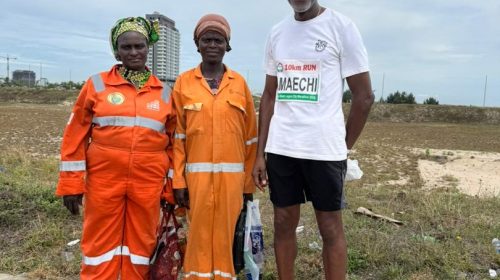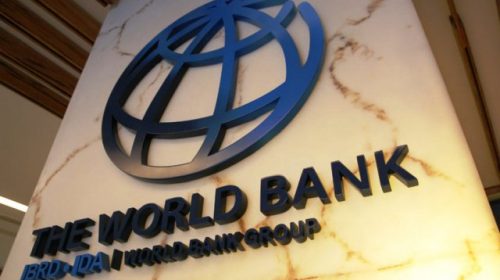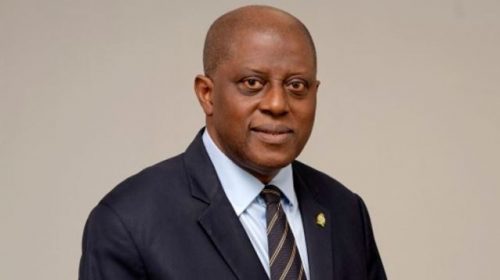Emefiele lists gains of FX restriction on 41 Items …outlines projections for 2018

L-R: Representative of Governor Akinwunmi Ambode of Lagos State and Secretary to the Lagos State Government, Mr. Tunji Bello; the Governor, Central Bank of Nigeria (CBN), Mr. Godwin Emefiele and the President/Chairman of Council, the Chartered Institute of Bankers of Nigeria (CIBN), Professor Segun Ajibola, at the 2017 Annual Bankers’ Dinner of the CIBN held in Lagos on Friday, November 10, 2017.
The Governor, Central Bank of Nigeria (CBN), Mr. Godwin Emefiele says the dogged implementation of the Bank’s policy, which restricts importers of certain items access to foreign exchange from the Nigerian Forex market, has led to improvements in the domestic production of those items and a reduction in Nigeria’s import bill.
Delivering the 2017 Annual Bankers’ Dinner of the Chartered Institute of Bankers of Nigeria (CIBN) in Lagos at the weekend, Mr. Emefiele asserted that local manufacturers were recording profits and major boosts to their revenue due to the policy.
According to him, in spite of opposition to the introduction of the policy restricting 41 items from Nigeria’s foreign exchange market, the faithful implementation of the policy had seen to the considerable decline in Nigeria’s import bills. From an average of about US$5.5 billion, he disclosed that the nation’s monthly import bill had fallen consistently to US$2.1 billion in 2016 and US$1.9 billion by half year 2017.
Citing the example of Psaltry International Limited (PIL), an agro-allied company based in Oyo State, he said the introduction of the policy had reversed the fortunes of the starch-producing company. He noted that prior to the policy; Psaltry had only few customers and a huge backlog of inventory. However, due to the policy, he disclosed that the company now has over 50 multinational clients including Nestle and Unilever, thereby saving the country $7 million in foreign exchange drawdown over the two years of the policy.
While also asserting that the access restriction policy had freed Nigeria from the perennially embarrassing importation of toothpicks, the CBN Governor disclosed to the delight of the audience that as part of the gains from the policy and in line with an agreement reached with Unilever, which moved its production facility to another country a few years ago, the company had agreed to commission a new Blue Band Factory in Agbara, Ogun State before the end of 2017.
Mr. Emefiele further disclosed that the implementation of the policy had had a great impact on Nigeria’s import bill and boosted local rice production in Nigeria. He recalled that Nigeria, in 2012, imported about 1.2 million metric tonnes of rice from a trading partner, noting that, in 2016, one full year of implementation of the policy, rice exports to Nigeria had fallen by 99 percent to only 784 metric tonnes.
“These are clearly verifiable successes of government’s attempts to create jobs locally, improve the wealth of our rural population, improve industrial capacities and ultimately attain economic growth in Nigeria,” he noted.
On the current position of the economy, Mr. Emefiele expressed delight that the Nigerian economy had recorded positive growth after five consecutive quarters of negative growth, thereby signaling its exit from recession. He also noted the downward trend in headline inflation from 18.72 per cent in January 2017 to the September 2017 figure of 15.98.
The CBN Governor equally expressed gladness that the Naira had appreciated from over N500/US$1 to about N360/US$1. While noting that the economy had seen stability in the exchange rate of the naira for over six months, he affirmed that the exchange rate was not only stable, but was also converging across various windows and segments of the market.
He noted that since the establishment of the Import and Export Window, the CBN had recorded about US$10 billion in autonomous inflows through this window alone. According to him, this reflected the effect of the increased transparency which that window accorded the foreign exchange market and its impact of improving investor confidence and business sentiments.
Speaking on the country’s reserves, Emefiele noted that the reserves had recovered significantly from about US$23 billion in October 2016 to over US$34.3 billion as at November 3, 2017.
“The accretion in reserves does not only reflect increased inflow but also our shrewd FX demand management strategy,” he added
In assessing the country’s rating on the ease of doing business, he disclosed that the World Bank’s ease of doing business indicator for 2018 showed that Nigeria, with a score of 52.03, improved 24 places to rank 145 out of 190, standing above the regional
average score of 50.43 recorded for sub-Saharan Africa. This is even as he noted that the Bank’s effort had reinforced the Presidential initiatives to improve ease of doing business in Nigeria.
Speaking on the economic outlook for 2018, Emefiele warned fiscal and monetary authorities against complacency and over-confidence because of current positive developments in the economy. Rather, he urged all to strive to improve and sustain the pace of recovery.
Although he noted that the import bill had dropped, he stressed that Nigeria’s manufacturing and agriculture sectors still had a long way to go if the country were to attain self-sufficiency in those sectors. Nevertheless, he assured that the CBN, on its part, would continue to fine-tune its policies and strategies based on its understanding of evolving developments and supported by in-house technical analysis and simulations. He assured that the CBN would remain proactive in ensuring that the welfare of Nigerians is optimised at any point in time.
Specifically, Mr. Emefiele noted that, that barring any unforeseen shocks, Inflationary pressure will continue to ease, expressing optimism that the rate may return to very low double digit or high single digit levels during the next year. He also expressed hope that the foreign exchange reserve will continue to grow; stressing that Nigeria can attain a foreign reserve position of about US$40 billion by end of 2018.
Mr. Emefiele also expressed hope that the economic recovery would consolidate and that the exchange rate stability currently being witnessed would continue. While expressing hope for even stronger policy coordination, collaboration and cooperation in 2018, he hinted that monetary policy stance could change when the underlying fundamentals become supportive.
While expressing delight that some of the pains that were associated with some of the CBN’s policies had become major gains in Nigeria’s economy, Mr. Emefiele urged all stakeholders to work towards creating a Nigeria, where balanced growth and shared prosperity is guaranteed for all.
2018 Budget lacks capacity to drive growth ….. Experts
From NGOZI Onyeakusi, Lagos
Experts at the ‘2018 Budget Seminar’ organised by the Securities and Exchange Commission (SEC) in Lagos, have described 2018 budget recently presented by President Muhammadu Buhari to the National Assembly as being over ambitious and lacks the capacity to drive growth.
According to the Chief Executive Officer, Financial Derivatives Company Limited, Mr. Bismarck Rewane, the budget lacked the capacity to drive growth especially at the period when the country is recovering from recession.
“It is not an expansionary budget; we are not spending our way to growth,” he said.
He equally pointed out that the budget failed to address multiple exchange rates in the economy adding that the prevalence of such rates would continue to distort the market. “Inflationary projection in the budget is not realistic. Government is silent on subsidy on power and petroleum products, and minimum wage. The projection for non-oil revenue is not realistic and the deficit gap may widen after all.”
Similarly, Professor of Economics at the University of Lagos, Ndubisi Nwokoma described the 2018 budget as being over ambitious and unrealistic. “Oil production is also ambitious. We are being too optimistic without a clear plan of how to achieve our target. Over the years, we have distorted the budget cycle. This will affect implementation and good accounting. Nigeria should have a clear budget cycle and budgetary interferences should be avoided.
N305 per dollar exchange rate is not real. I foresee a wide margin in the budget implementation. Government ambition is magical. If we hasten the passage of the 2018 budget for February or so, 2017 budget implementation will be inconclusive.
We are not learning from the challenges or problems of 2017 budget. It is likely we fall into same mess. Our budgetary woes have become recurrent, and we are not learning from the past.”, he said.
Corroborating, the Director-General, Lagos Chamber of Commerce and Industry, Mr. Muda Yusuf, faulted the fact that the budget was silent about Contractors’ arrears to the tune of about N2 trillion. “Being totally silent about this is bad. Contractor arrears are also becoming a threat as over ‘N2tn is at stake. The risk involved in doing business with government is becoming worrisome.
He however commended the budget for focusing more on infrastructure, though spelt out that private sector participation in the budget was not made clear especially in terms of infrastructure financing.
“That the budget is focusing more on infrastructure is a good way to go. But given that subsidy areas are becoming a huge threat to the economy and the budget is rather silent on it calls for worry. “The private sector participation in the budget was not made clear especially in terms of infrastructure financing. The private sector should play a major role here”, he stated.
Senate committee discovers 32 revenue leakage channels, recovers N140b to FG
From NGOZI Onyeakusi, Lagos
The chairman, senate joint committee on customs, excise and tariff and marine transport, Mr. Hope Uzodinma has said that the committee recovered N140 billion from investigated companies.
Presenting the committee’s interim report on the floor Uzodinma said some collection banks had so far remitted N128 billion to the Central Bank of Nigeria (CBN) while, from the selected 60 companies under investigation, over N12 billion payments has been made to government.
“As a result of this exercise, some collection banks have made additional remittances to the Central Bank of Nigeria to the tune of N128 billion and evidence of payment and receipt has been received by the committee.
“From the selected 60 companies, over N12 Billion payments have been made to the government voluntarily by the companies based on their own internal self-audit after receiving documented evidence of their culpability from our committee,” he said.
He also said the panel had identified 32 leakage channels as the major sources of revenue loss in the import-export value chain.
The leakage channels include undervaluation, wrong tariff classification, abuse of waivers and concessions, abuse of diplomatic cargo and personal effects privilege to clear consignments to submission of forged documents for pre-arrival assessment report (PAARS) and single goods declarations (SDGS) processing, pre-arrival assessment report (PAAR) used for more than one single goods declaration, non-utilization of pre-arrival assessment report (PAAR) after single goods declaration (SGD) cancellation and mismatch and discrepancies in consignees, goods description and tariff classification.
Other sources of leakage identified by the committee include falsification of import documentation such as pro forma invoice, final invoice, bills of lading, National Agency for Food Drug Administration and Control (NAFDAC) and Standards Organisation of Nigeria Conformity Assessment Programme (SONCAP).
There are also issues like non-imputation of complete vehicle identification number (VIN) in inspection acts and bills of lading in order to undervalue vehicles, clearance of new vehicles without form M or pre-arrival assessment report (PAAR) processing in clear violation of destination inspection, abuse of temporary importation by conversion to home use without payment of import duties, falsification of factory production registers, inaccurate unit cost analysis (UCA) and returns leading to significantly low excise duty collected as compared to actual large scale volumes of excisable commodities locally manufactured. Other sources of revenue losses include abuse of fast track blue lane, illegal creation, amendment, and cancellation of single goods declaration (SGDs), pre-arrival assessment reports (PAARs) and bills of lading, and importation under pretext of completely knocked down privilege reserved for bona fide manufactures leading to reduction in import duties payable among others.
Uzodinma noted that the infractions disproportionately distorted the economic profile of the country and placed extensive pressures on the nation’s scarce foreign exchange.
“It also negates all Central Bank of Nigeria initiated foreign exchange management plans. This is because a distorted forex requirement does not essentially reflect the actual forex need of individuals and businesses in the country. This situation benefits only the purveyors of capital flight from the country and adds absolutely no value to the nation,” he added.
It would be recalled that the joint committee was set up by the senate to carry out a holistic investigation into the activities of the Nigeria Customs Services (NCS) with a view to identifying leakages and irregularities in the system and come up with recommendations that will reinvigorate the revenue drive of the NCS.
Newsgezett.







Leave a Reply